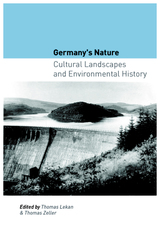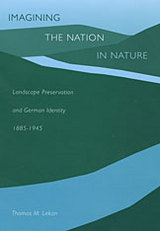
Now for the first time, a survey of the country's natural and cultural landscapes is available in one volume. Essays by leading scholars of history, geography, and the social sciences move beyond the Green movement to uncover the enduring yet ever-changing cultural patterns, social institutions, and geographic factors that have sustained Germany's relationship to its land.
Unlike the American environmental movement, which is still dominated by debates about wilderness conservation and the retention of untouched spaces, discussions of the German landscape have long recognized human impact as part of the "natural order." Drawing on a variety of sites as examples, including forests, waterways, the Autobahn, and natural history museums, the essays demonstrate how environmental debates in Germany have generally centered on the best ways to harmonize human priorities and organic order, rather than on attempts to reify wilderness as a place to escape from industrial society.
Germany's Nature is essential reading for students and professionals working in the fields of environmental studies, European history, and the history of science and technology.

One of the most powerful nationalist ideas in modern Europe is the assertion that there is a link between people and their landscape. Focusing on the heart of German romanticism, the Rhineland, Thomas Lekan examines nature protection activities from Wilhelmine Germany through the end of the Nazi era to illuminate the relationship between environmental reform and the cultural construction of national identity.
In the late nineteenth century, anxieties about national character infused ecological concerns about industrialization, spurring landscape preservationists to protect the natural environment. In the Rhineland’s scenic rivers, forests, and natural landmarks, they saw Germany as a timeless and organic nation rather than a recently patchworked political construct. Landscape preservation also served conservative social ends during a period of rapid modernization, as outdoor pursuits were promoted to redirect class-conscious factory workers and unruly youth from “crass materialism” to the German homeland. Lekan’s examination of Nazi environmental policy challenges recent work on the “green” Nazis by showing that the Third Reich systematically subordinated environmental concerns to war mobilization and racial hygiene.
This book is an original contribution not only to studies of national identity in modern Germany but also to the growing field of European environmental history.
READERS
Browse our collection.
PUBLISHERS
See BiblioVault's publisher services.
STUDENT SERVICES
Files for college accessibility offices.
UChicago Accessibility Resources
home | accessibility | search | about | contact us
BiblioVault ® 2001 - 2024
The University of Chicago Press









